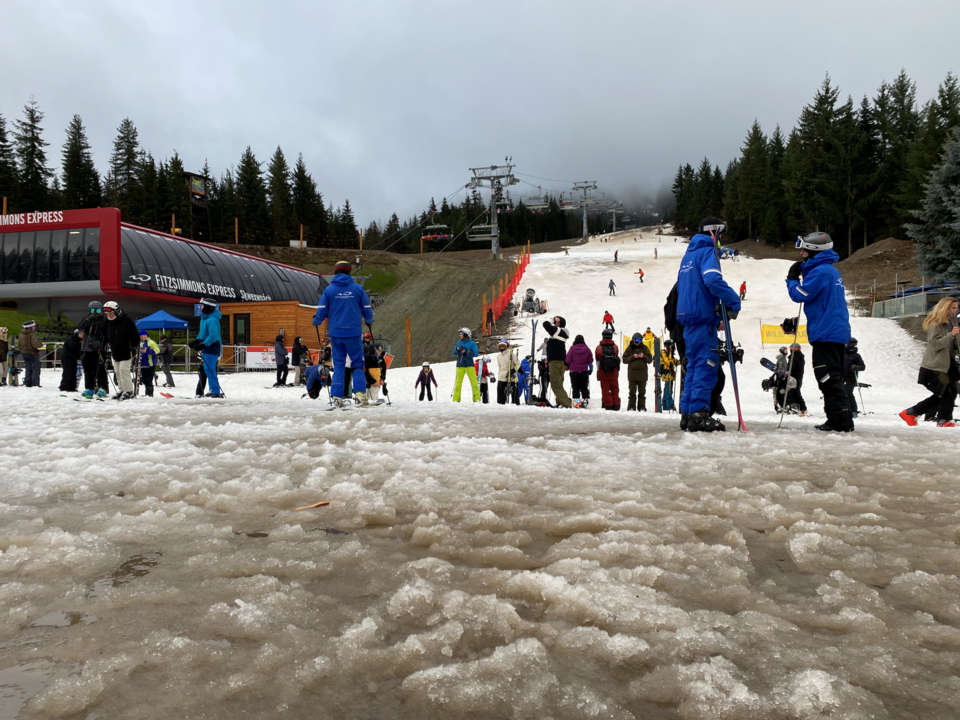As it turns out, Whistler isn’t the only B.C. ski area struggling with high temperatures and low snowfall as 2024 gets underway.
As of Jan. 2, Whistler Blackcomb had a base depth of about 99 centimetres, with 147 of 234 trails open and 23 of 27 lifts operational—about 63 per cent of the resort.
The B.C. government’s Jan. 1 snow and water bulletin won’t be posted until Jan. 9, but as of Pique’s weekly deadline, the provincial average for all snow weather stations in the province was just 68 per cent of median.
Here’s the lay of the land at ski resorts near and far as of Tuesday, Jan. 2.
POWDER PLAY
B.C. is offering up a mixed bag for skiing in early 2024, with just one resort—Powder King north of Prince George—reportedly open 100 per cent.
As of Jan. 2, all 38 of Powder King’s trails were open, and three of three lifts operational, with a base depth of up to 135 centimetres.
In a close second is Panorama Mountain resort in the Interior, which was reportedly 97-per-cent operational to start the new year, with 140 of 144 trails open, 11 of 11 lifts running, and a base depth of 66 cm.
At Kamloops’ Sun Peaks, 106 of 137 trails are open, and 12 out of 13 lifts operational—about 77 per cent of the resort. Sun Peaks is reporting a base depth of up to 76 cm as the new year gets underway.
And in Revelstoke, 32 of 59 trails are open, and four of six lifts (about 54 per cent), with a base depth of up to 79 cm.
So while conditions are definitely challenging, most B.C. ski resorts are making the best of it.
Some, however, aren’t so lucky.
As of this writing, North Vancouver’s Mt. Seymour Resort is temporarily closed as officials wait for snow.
“We had a bit of a weak start, but the rain last week washed us out,” Mt. Seymour marketing and communications manager Simon Whitehead told CBC in the last week of December.
“Luckily the forecast is looking much stronger for next week, so we’ll hopefully be back in business pretty soon.”
Whitehead told CBC unseasonably warm weather impacts the ski area once every eight years or so—so it’s something staff are prepared for.
SOUTH OF THE BORDER
Looking south, Vail Ski Resort in Colorado has a base depth of about 94 cm, with 240 of 275 trails open and 27 of 31 lifts operating (about 81 per cent).
Around the bend at Aspen-Snowmass, officials are reporting a base depth of 86 cm, with 282 of 366 trails open and 33 of 41 lifts operational (or about 77 per cent).
So while there is more snow in Colorado than in B.C. at the moment, like their Canadian counterparts, U.S. officials are still awaiting the real arrival of winter.
According to the Aspen Times, Colorado’s mountains are experiencing their worst snowfall season in recent memory.
The last time Colorado saw this little snow in December was 2013, National Weather Service forecaster Zach Hiris told the Times.
“We’re not too far below normal at this point for most of Colorado; most of the bigger basins are sitting somewhere between 60 and 80 per cent of snowpack,” he said.
The United States Department of Agriculture estimates it will be at least another 100 days until snowpack is at its median peak.
WHERE IS ALL THE SNOW?
So, if the snow isn’t falling in Canada and the U.S., which ski resorts are seeing the goods?
According to snow-forecast.com’s World Snow Overview, Russia or France is the place to be if you’re looking for an abundance of fresh powder in the week ahead.
Dombai resort in Russia could see a whopping 80 cm in the next three days, according to snow-forecast.com, while a smattering of French ski areas will see up to 40 cm before the end of the week.
Of the 20 resorts listed on snow-forecast’s worldwide outlook, only two—Alpenglow and Eagle Crest Ski Area—are located in North America (and none in Canada).
So if you’re desperate for snow and short on patience, best pack your balaclava. We hear it’s cold in Russia.
Ski-Town Rundown is a new column from Pique Newsmagazine highlighting news from other ski resorts, near and far. Got a skiing news tip? Email editor Braden Dupuis at [email protected].




